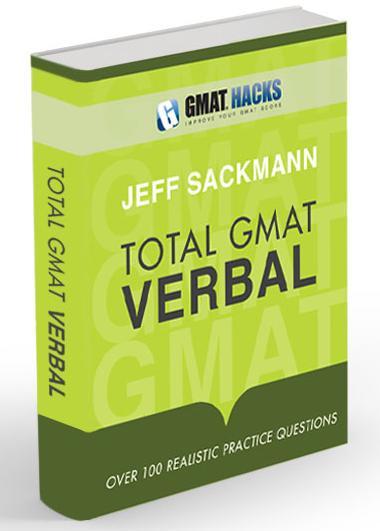
Bookshelf
|
|
Total GMAT Math Jeff's complete Quant guide, on sale now! |
|
|
Total GMAT Verbal Everything you need to ace GMAT Verbal! |
1,800 Practice Math Questions
Buy Jeff's books at Amazon.com

GMAT Official Guide, with IR
OG Math | OG Verbal
OG12 & Quant Rev solutions!
GMAT Question of the Day
Beginner's Guide to the GMAT
GMAT Hacks Affiliate Program

Recent Hacks

Categories
- General Study Tips
- Goals and Planning
- CAT Strategy
- The Mental Game
- GMAT Math Strategy
- GMAT Math Topics
- Mental Math
- Data Sufficiency
- Critical Reasoning
- Reading Comprehension
- Sentence Correction
- Analytical Writing Assessment
- Integrated Reasoning
- IR Explained
- Business School Admissions
- GMAT Prep Resources
- Practice Questions
- Total GMAT Math
- Total GMAT Verbal
- GMAT 111

AWA: Conclusion or No Conclusion?
| You should follow me on Twitter. While you're at it, take a moment to subscribe to GMAT Hacks via RSS or Email. |
I've graded a lot of essays in my life. My least favorite part of reading student essays is the obligatory conclusion in which the writer pads the essay by restating half of the points made up to that point. Conclusions like that don't serve any clear purpose, and they aren't going to impress the reader.
Why, then, is a conclusion part of every essay template, especially for essays on exams like the GMAT?
Sample AWA Issue Template
Let's consider a basic template for the GMAT Analytical Writing Assement "Analysis of Issue" essay.
- Introduction (1 paragraph)
- First argument (1 paragraph)
- Second argument (1 paragraph)
- Third argument, or an attack on a likely opposing argument (1 paragraph)
- Conclusion (1 paragraph)
The introduction certainly serves a purpose. If done right, you'll demonstrate in a few sentences that you understand the topic you're asked to write about and that you have a clear opinion that you will defend in the following paragraphs. That's worth 20% of your essay.
However, in a short essay (probably 250-300 words, no more than 400), is it worth devoting nearly as much time to wrapping things up? In that time, your reader won't have forgotten what your point was, nor will you have elaborated so much on any one argument that you need to make your point forcefully again.
Avoiding a Conclusion
As you can probably tell, my question in the headline isn't very honest. I don't wonder whether to use a conclusion or not. I just don't do it.
However, let me be clear. I'm not suggesting that you fail to conclude your essay. By all means, end on a high note, one that makes a general claim in support of your opinion. But don't spend 20% of your essay restating your points just because a template says so.
Consider the following options:
In conclusion, it is clear that the government should censor television and radio programs for offensive language and behavior. As I've shown in the preceding paragraphs, children often watch television unattended, and government intervention is required to prevent them from seeing disturbing images. Also, for adults who want to enjoy programs with offensive content, there are many options, such as DVDs and online content. Those who argue on behalf of press freedom fail to recognize the minimal infringement of such censorship and the great benefits that it offers.
[fourth paragraph: an attack on a likely opposing argument.] This argument is common, but it fails to recognize the minimal infringement of such censorship. As shown in the preceding paragraphs, such limits are a small price to pay for the great benefits that censorship offers.
Which do you prefer?
The Benefits of Skipping the Conclusion
The first alternative above is much, much longer, even though it doesn't raise any points that aren't already in a relatively short essay. Simply skipping the two or three extra sentences probably saves you a few minutes. You only have 30 minutes, so time is of the essence.
Beyond the time-saving advantage, you'll look like a more competent writer. The first alternative above reeks of mediocre high-school age writing. Plenty of people will finish up their GMAT essays like that, and some of those people will score well in spite of it. But if you can finish on a conclusive note without restating such a large portion of your essay, you'll sound like a better writer while saving time for everything else.
About the author: Jeff Sackmann has written many GMAT preparation books, including the popular Total GMAT Math, Total GMAT Verbal, and GMAT 111. He has also created explanations for problems in The Official Guide, as well as 1,800 practice GMAT math questions.
 |
Total GMAT Verbal
The comprehensive guide to the GMAT Verbal section. Recognize, dissect, and master every question type
you'll face on the test. Everything you need, all in one place, including 100+ realistic practice questions. |